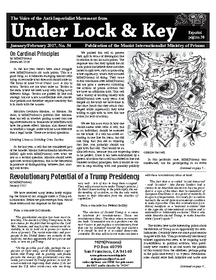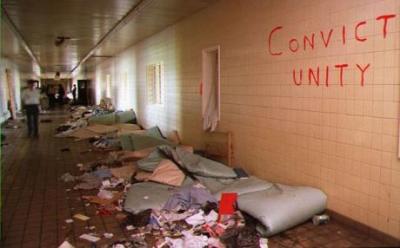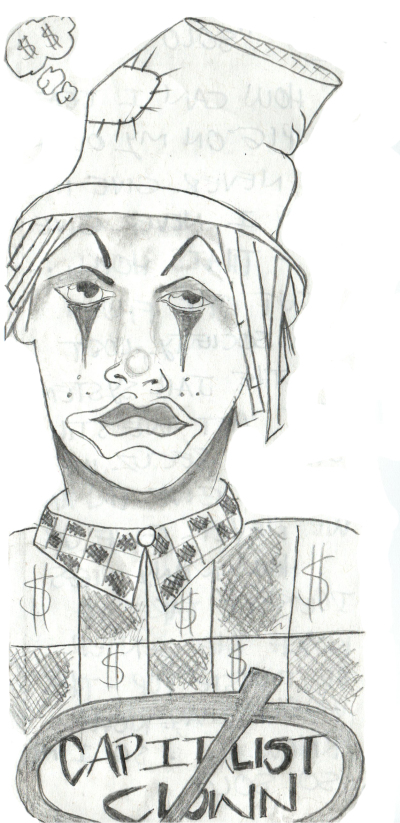
Revolutionary Potential of a Trump Presidency

We have received many letters lately exploring the future of our struggle under a Trump administration. Below we print excerpts from two of those letters and our response on the topic.
From a comrade in Colorado:
“The presidential election has been most interesting. The election of King Trump may be the last chance for the folks that brought us the Cold War, Vietnam, and much of the current world instability, to try to hold on to power (or make a show of power). The racial minorities and poor people in the United $tates are actually in the majority, but they apparently did not get out and vote, so now we get Trump.
“On the possible good side, perhaps the explosion of right wing, world domination capitalism that Trump will be pushing will finally provoke the masses (the proletariat) once they really get screwed by Trump policies, to look for a real solution to improving their status. (I do not mean the U.$. labor aristocracy who are doing very well – lots of toys to keep them occupied. They will get even more under Trump’s policies.) By that I mean looking to the philosophy, the understanding of socialism, as the the only viable means to their liberation from the shackles of capitalism.”
From a comrade in a Federal facility:
“The election of Donald Trump is a cause to celebrate for revolutionaries. These are revolutionary times. The times where movements are built. Communists are in a position over the next 4 years to put in place a revolutionary front that can be sustained beyond the next election if it should be lost to a so-called democratic contender. No time will be lost to make revolution with these revolutionary times at hand.
“The fact that a so-called ‘social democrat’ - read ‘socialist’ - like Bernie Sanders had a chance in an Amerikan election to become president is a sign of the times that ‘socialization’ of European Amerikans is at a point of maturity in its epoch of imperialism. It is ready for socialism but lacks the world-historical material condition to make it possible. Thus this contradiction (condition) manifests as a ‘national socialism’ that is the opposite of international socialism and is nationalist or ‘nationality exclusive.’ That is why white Amerika elected Trump, to make Amerika white (‘great’) again.”
MIM(Prisons) responds: The writers here make interesting points about the election of Trump as an opportunity for revolutionaries. Certainly there are some good reasons to agree with this. Trump’s extremely reactionary cabinet appointments seem to be inspiring many Amerikkkans to political activism who previously were content to sit and watch the politics of this country from the sidelines, perhaps going to the polls once every 2 or 4 years. Revolutionaries should seize their initiative and make sure that people have access to information about why electoral politics aren’t the answer, if they really are seeking change for the better of the majority of the world’s people.
Of the large portion of people who are eligible to vote but don’t vote in presidential elections we see a few major groups:
-
People who don’t care who wins because they know the government is
serving their interests generally by continuing on with imperialist
plunder to keep people in the United $tates rich. For the most part this
is the labor aristocracy and is the vast majority of U.$. citizens.
Where our comrade in Colorado says poor people are a majority in the
United $tates, instead our class analysis says the labor aristocracy is
the majority, and if they didn’t vote it’s because they knew either
Clinton, Sanders, or Trump would all be fine to serve their interests.
-
People who don’t care who wins because they know that both candidates
support national oppression and will work counter to their interests.
This is the oppressed nation lumpen and oppressed nations generally; the
“racial minorities” referred to by our Colorado comrade.
- People who genuinely oppose imperialism and so can’t in good conscience vote for a candidate who will run the imperialist state. This is a small number of revolutionary activists within U.$. borders.
As our comrade in Colorado points out, the U.$. labor aristocracy is comfortable and may even get more comfortable under a Trump administration. As much as the bourgeois liberals are crying about Trump’s election, the potential for socialist revolution to be initiated within the United $tates is slim to none. They are upset about LGBTQ rights and Trump’s overt racism and sexism and anti-environmentalism, but on the whole don’t mind extracting wealth from Third World peoples for their own benefit. The best we can expect from the Amerikan masses’ own volition is a push toward social imperialism, which still leaves the Third World out.
Even supporters of Bernie Sanders are not socialist, as much as Sanders tries to claim that’s what eir politics are about. Sanders was a candidate with a clear imperialist line on international issues. While ey might have planned to spread around the wealth a bit more to U.$. citizens, ey still falls firmly in the imperialist camp, supporting wars of aggression, and financing terrorist governments like I$rael. In this regard, Trump, Obama and Sanders are more similar than they are different. Our Colorado comrade says Trump will push world domination capitalism, but we’ve been seeing this for decades and it didn’t slow down for a second under Obama. There is no way to reconcile Amerikan imperialism with socialism. No elected candidate will make this change. Only by forcibly overthrowing the government will we be able to implement socialism.
Our comrade in a Federal prison brings up the question of the need for world-historical material conditions to be in place to bring the Euro-Amerikan nation toward socialism. This comrade’s claim that Euro-Amerikans are well on their way to supporting a socialist shift is likely overstated. But if the oppressed internal semi-colonies and oppressed Third World nations are enraged by Trump’s rhetoric and policies, then we can expect revolutionaries in Amerikkka to grow in strength and number as well. The oppressed nations’ response, internally and abroad, to a Trump’s presidency is where we see real revolutionary potential.
This writer is correct that socialism (in the short term, and communism in the long term) is the only way to liberate the oppressed from capitalism. But when we recognize that the majority of people in the United $tates are benefiting from capitalism, we can see that most people in this country, voters and non-voters alike, aren’t being fooled by mis-information. Rather they correctly understand that if we were to give back all the wealth stolen from Third World countries and stop the plunder of imperialism tomorrow, standards of living in this country would go down dramatically.
Still, there are very good reasons why Amerikans should oppose capitalism, including the destruction of the environment, the deadly culture of patriarchy and violence, and basic humynity towards other human beings around the world. And so we conclude that if Trump’s presidency leads some Amerikans to greater global awareness and inspires them to oppose capitalism, it is our job to provide a correct analysis of the system and opportunities for action against the system.





 Download printable PDF
Download printable PDF





